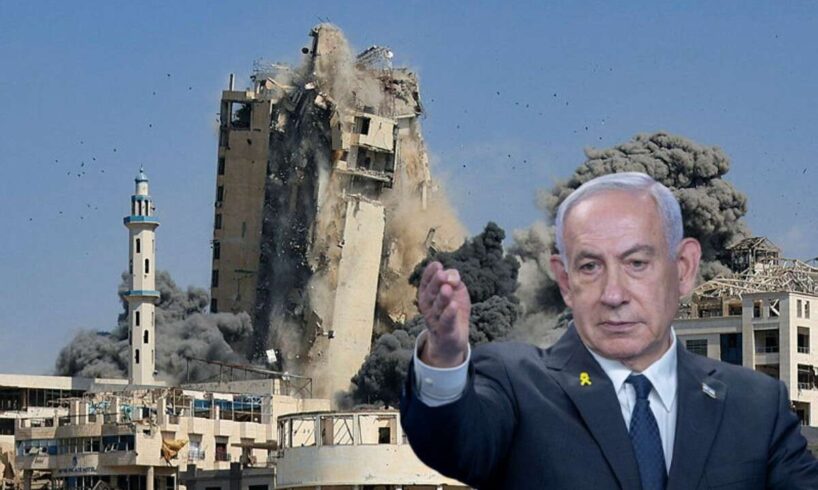
Between diplomatic isolation and a final opportunity from the White House, Israel is seizing its last chance to shape a victorious end to the war in Gaza over Hamas. The challenges on the path to conquering Gaza City have not yet manifested on the ground as much as they have around the negotiation table. The IDF Chief of Staff Eyal Zamir has shown no interest in another campaign that would bring the IDF closer to a military government on the one hand, while the European Union has worked rapidly on resolutions expected to leave Israel economically bruised. The only support given to the diplomatic echelon, which nevertheless decided not to abandon the goal of toppling Hamas, was found in a no less important place, perhaps much more so – the Trump administration in the US.
Smoke rises following an Israeli airstrike in the west of Gaza City, Gaza Strip, September 10, 2025 (EPA/MOHAMMED SABER)
US Secretary of State Marco Rubio reaffirmed the administration’s commitments to Jerusalem just at the start of the week: the return of all the hostages and a future for the Gaza Strip, and more importantly for Israel – without Hamas. Yet, even while relying on Donald Trump, Benjamin Netanyahu is deeply concerned and cannot hide it. He is worried about diplomatic isolation and Israel becoming ostracized among Western nations. While his senior ministers are confident this is a linguistic slip of the tongue, his close associates say it is a recognition of the forecast. The proof of this is that the conference at the Ministry of Finance was not the first time Netanyahu spoke about Sparta. The previous evening, in a restricted security briefing with the security establishment’s top leadership regarding the Gaza City campaign and its impact on the hostages, Netanyahu repeated the same chilling prediction to those present, word for word: We must be prepared to be self-reliant.
Israeli soldiers with military vehicles gather at a position on the southern Israeli border with the Gaza Strip, near the Palestinian city of Rafah, May 2024 (EPA/ATEF SAFADI)
He learned this lesson during the Biden administration’s tenure, when the previous administration imposed a brutal weapons embargo, masked in pleasant words, which endangered our fighters on the battlefield – no new deals and no munitions. Even then, in discussions with him, Netanyahu sounded concerned. Very concerned. Following the discovery of the empty inventories in the American warehouses in Israel on October 7 because of the war between Russia and Ukraine, Israel expanded its production lines and began working on ammunition manufacturing 24/7. So what is the source of the new chilling forecast? The threats heard from European nations which, as Netanyahu aptly described them, are subject to blackmail from Muslim immigrants at home. These accelerated the realization that also held a significant place in the Nagel Committee’s conclusions – a move toward independent security production so that in the next war, we will not require approval for every shell our soldiers fire in the area.
Netanyahu’s series of explanations immediately after his dark prophecy was intended not to create a situation of diplomatic isolation from thin air with the words of his mouth. He addressed this at a press conference he convened Tuesday evening, where he explained once again that he was only referring to the issue of security independence. According to Netanyahu, there is an impact on the stock market and the markets, and a late clarification is better than a prolonged silence, yet it is not possible to sugarcoat the coming political reality: The actions against us in the UN and the European Union could have crippling effects on Israel worldwide. With all due respect to the threat of a boycott at the Eurovision contest, this is more than just a singing competition in which Israel may or may not perform.
This is the reason why the campaign for Gaza City is the great gamble that Netanyahu took on the continuation of the war in light of Hamas’ foot-dragging and insolent demands. At this stage, he could have gone out and explained that the credit for continuing the war has run out and that losses should be minimized, the hostages should be taken, and Hamas’ demands should be met. But from a future perspective, such a compromise, had he succumbed to it, would have been a cause for regret for generations.
IDF troops against the backdrop of the Gaza Strip (reproduction) / REUTERS/Amir Cohen; REUTERS/Dawoud Abu Alkas
Hamas would have remained in place, and the civilians of the Gaza border communities would have remained in the crosshairs, and subsequently, the residents of all of Israel. Because cowardice in the region is perceived as weakness, and flight invites the next attack. The entry of the IDF into Gaza under the guidance of the diplomatic echelon will not be easy and is expected to last more than two months. This will also be the last major campaign in the Strip and it is intended to achieve what has not yet been achieved – Hamas’ surrender to Israel’s demands, the return of the hostages, and conditions for a conclusion that will ensure long-term security. To this end, Netanyahu will need to continue to juggle the diplomatic arena to prevent a scenario of complete isolation on the one hand and to provide a future of prosperity and security on the other by completing the military mission.





